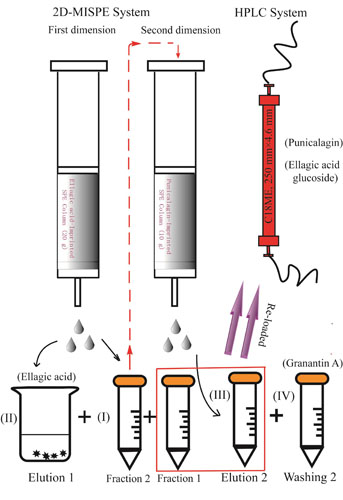Molecular imprint is a promising technique used for preparing materials with specific selectivity to a determined target. It is widely used in enrichment or separation such as the purification of bioactivity components from medical plants. However, there are limitations for the application of molecular imprint.
Researchers at Xinjiang Technical Institute of Physics & Chemistry (XTIPC) of Chinese Academy of Sciences constructed a purification system named as “two-dimensional” molecularly imprinted solid-phase extraction (2D-MISPE), which assembles the advantages of two different molecularly imprinting techniques. This study was published in Journal of Chromatography A.
Researchers imprinted ellagic acid and punicalagin in batch mode to separate ellagitannins in pomegranate peel extract. Then, powders of molecularly imprinting polymer (MIP) were filled into cartridge to form MISPE columns of semi-preparative grade respectively.
After systematically investigating the functionality of MISPE, researchers put forward a concept named as “functionality complementation”, which could be used to optimize the efficiency of 2D-MISPE based on “orthogonality” of two-dimensional liquid chromatography (2D-LC). Under the optimum condition, ellagic acid and punicalagin MISPE were individually selected as the first and second dimension of 2D-MISPE. 2D-MISPE was then used to fastly purify tannins in pomegranate peel extract.
Researchers obtained four fractions enriched in ellagic acid, punicalagin, granatin A, ellagic acid glucoside, and they found the purity of granatin A reaches to 92%. Others were further purified to 97% combining with liquid chromatography (LC) and crystallization.
Compared with the single LC procedure, the presented method was simple and very fast, showing the potential for further industrial application. Meanwhile, the concept “functionality complementation” was expected to provide a new approach for the evaluation of 2D-MISPE.

Figure : Semi-preparative 2D-MISPE coupled with crystallization and reverse-phase liquid chromatography for the fast purification of four tannins in pomegranate husk extract.(Image by XTIPC)
Contact:
Prof.Haji Akber Aisa
E-mail:haji@ms.xjb.ac.cn
Xinjiang Technical Institute of Physics & Chemistry, CAS
